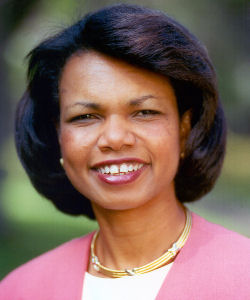Rice defends US record on halting nuclear proliferation
 Rabat, Morocco/Washington - A day after the US clinched international approval for a nuclear trade deal with India, US Secretary of State Condoleezza Rice defended the George W Bush administration's record in halting nuclear proliferation.
Rabat, Morocco/Washington - A day after the US clinched international approval for a nuclear trade deal with India, US Secretary of State Condoleezza Rice defended the George W Bush administration's record in halting nuclear proliferation.
Speaking to reporters in Rabat, Morocco, late Sunday, Rice cited the dismantling of the AQ Khan nuclear weapons' network, the proliferation security initiative that has stopped ships on the high seas carrying banned weapons cargo, Libya's renouncing weapons of mass destruction, the UN sanctions on Iran and progress in getting North Korea to dismantle its nuclear programme.
"I think the record of this administration is very strong. I think we have left this situation, or this issue, in far better shape than we found it," she said, according to a transcript released in Washington.
The United States on Saturday succeeded in convincing countries that India could have access to global nuclear markets, in a boost to the rising Asian power's nuclear energy ambitions.
India will now, pending final approval in the US Congress, be able to access the markets despite the fact that it has not signed the Nuclear Non-Proliferation Treaty.
Diplomats reached consensus on an export waiver for India at the end of a three-day meeting in Vienna of the Nuclear Suppliers Group (NSG), which sets nuclear export rules.
The trade waiver is an essential part of Washington's 2005 nuclear trade deal with New Delhi, which is seen as as a cornerstone for improving strategic relations.
Rice said the non-proliferation treaty was "valued by all members of it."
"But the fact is that India, a state that has a very good record on proliferation, has operated outside of it," she said.
She said the agreement would allow India to pursue civil nuclear technology "for all the reasons that states need to do that, given the energy crunch, given the environmental issues associated with hydrocarbons."
The move also "expands the reach" of the International Atomic Energy Agency, the UN's nuclear watchdog, she said.
The NSG was formed in reaction to India's first atomic weapons test in 1974, which it conducted using foreign nuclear technology.
Apart from the US, countries such as France and Russia are hoping to win lucrative nuclear contracts with India, which plans to build at least eight new nuclear reactors by 2012. (dpa)